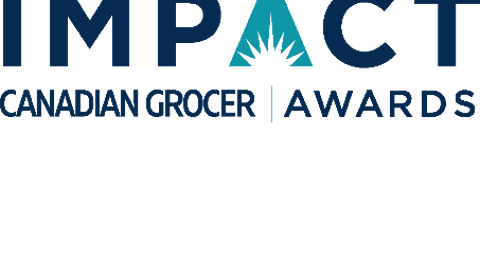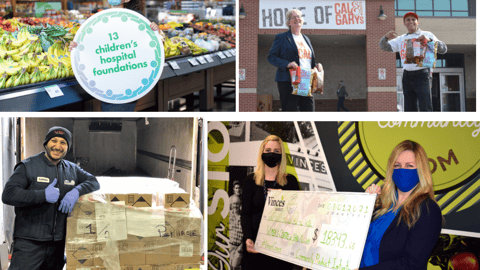2021 Impact Award winners: Sustainability
To celebrate Canadian grocery retail and CPG businesses that are going above and beyond to make the world a better place, this year we launched the Canadian Grocer Impact Awards.
We recognized 33 winners in four categories: Sustainability; Supporting Employees; Diversity, Equity and Inclusion; and Community Service. (Click here for the full list of winners.)
Eleven companies took home the award in the Sustainability category, and here's why:
Burnbrae Farms
Burnbrae Farms has long recognized the opportunity to reduce agriculture’s environmental impact; that’s why the forward-thinking egg business has been investing in energy-saving technologies and renewable energy sources, including solar power. In 2019, the company completed construction of Canada’s largest solar-powered commercial layer hen farm in Woodstock, Ont., part of Burnbrae’s commitment to reduce the environmental impact of its operations, reduce energy use, and lower its carbon footprint across the business. The farm is completely off the hydroelectric grid, is energy efficient, and has been a commercial success. The company is currently building its second solar farm in Lyn, Ont.
Burnbrae has also worked with Bullfrog Power (a Canadian green energy company) since the early 2000s, and currently markets specialty eggs with this program. According to the company, part of Burnbrae’s strategy has always been to offer consumers choice. Eggs from these green energy-powered operations are marketed under the newly developed Green Valley Farms brand name. Says the company: “We are very conscious of our environmental impact and we know that, increasingly, business strategies and environmental consciousness are only to become more closely aligned.”
Danone Canada
Since 2017, Danone has been led by its “One Planet. One Health” motto, reflecting the idea that the health of the planet and the health of its inhabitants are closely interconnected. “It is increasingly clear that our global food system requires a more sustainable path forward,” says Isabelle Rayle-Doiron, general secretary & general counsel, Danone Canada. “At Danone Canada, we make decisions that take the long-term interests of future generations into consideration to benefit people and the planet.”
To live up to its motto, Danone has committed to net zero carbon emissions by 2050. Danone Canada has made significant changes to its supply chain, including switching its plant-based long-distance deliveries from trucks to train; partnering with retailers to increase payloads; and opening a new distribution centre in Mississauga, Ont. that’s closer to many of its customers. Danone Canada also advocates for regenerative agriculture practices by building relationships with various stakeholders to improve soil health, animal welfare and empower new generations of farmers. To that end, Danone brand Silk is partnering with the New Acre Project, led by ALUS Canada, to support the management and restoration of 90 acres of farmland in seven communities throughout Alberta, Ontario and Quebec. It also prioritizes the circular economy: it’s committed to making 100% of its packaging recyclable, reusable or compostable by 2025 and to incorporating an average of 50% recycled material into its packaging, and is a founding member of the Circular Plastics Taskforce and a signatory of the Canada Plastics Pact.
Conagra Brands
As it aims to address the economic, environmental and social impacts directly linked to its activities and products, Conagra Brands has launched initiatives in four areas: good food, responsible sourcing, better planet and stronger communities. Key goals and successes so far include making 100% of plastic packaging renewable, recyclable or compostable by 2025. In 2018, Conagra introduced Healthy Choice Power Bowls, which feature a serving bowl made from plant-based fibres. By using plant-based fibres instead of plastic, the carbon footprint of manufacturing the bowls is reduced by 50% to 70% across select product lines. Conagra is working with suppliers and other stakeholders to improve the treatment of broiler chickens by 2024, and have a 100% cage-free egg supply by 2025; and the company’s national recycling solution for Angie’s BoomChickaPop via TerraCycle Canada allows consumers to recycle their typically non-recyclable packaging, free of charge. Conagra has also committed to reducing absolute Scope 1 and 2 greenhouse gas emissions by 25% by 2030. And the Hunt’s tomato facility in Dresden, Ont., cleans and recycles water used to process tomatoes into farm irrigation water, supporting conservation throughout the supply chain and regeneration of local watersheds.
“We strive to nourish the planet by sourcing raw ingredients and packaging materials responsibly while generating less waste for disposal, reducing energy use and water use, and helping preserve our forests and other resources,” says Michael Fazio, director of sales & Canadian lead of sustainability at Conagra Brands.
Freson Bros.
The folks at Freson Bros. know what it takes to run a sustainable grocery business that’s just as relevant today as it was when it first opened more than 65 years ago. Case in point: its 15th store, launched this past March in Edmonton, takes sustainability to new heights with a series of green initiatives ranging from energy conservation and composting to the cultivation of honeybees.
Solar panels provide 15,511 kWh of power to the store annually, while charging stations in the parking lot support electric vehicles. Heat is constantly reclaimed from store refrigerators to heat water and the warehouse area, while cooking oil from the kitchen is diverted from landfills and converted for industrial re-use. The rooftop houses a 2,000-sq.-ft. garden with composting bins for zero net waste, as well as a collection of beehives where honeybees thrive. Through the Bee Project, the grocer is helping educate customers on how honey is produced and the importance of bees in our ecosystem. “The enthusiasm demonstrated by our team members for both the rooftop garden and the beehives has been overwhelming,” says store manager Kerry Waldo. “Our customers have been able to experience the freshest produce from our rooftop gardens and we are looking forward to providing them with really fresh honey in the future.”
Kruger Products
Sustainability has been a core value at Kruger Products for more than a decade—the company launched its first formal five-year sustainability strategy in 2010, called “Sustainability 2015,” which eventually evolved into “Sustainability 2020.” Key achievements during that time included installing the first biomass gasification system in Canada’s pulp and paper industry; being the first Canadian tissue manufacturer to earn Forest Stewardship Council Chain of Custody certification; achieving ISO50001 Energy Management Certification from the Bureau de normalisation du Quebec; and being named one of Canada’s Best 50 Corporate Citizens by Corporate Knights. The company reduced its energy consumption intensity by 15%, reduced its greenhouse gas emissions by 26%, and reduced its water consumption by 37% (vs. 2009 levels).
“When we began our formal sustainability journey more than a decade ago, we understood that sustainability is a commitment that requires ongoing dedication, continuous improvement and investment,” says Steven Sage, the company’s vice-president, sustainability. With that in mind, Kruger has now launched a whole new sustainable development strategy called “Reimagine 2030: transformative growth and sustainable innovation.” A 10-year plan, this strategy has been developed to evolve as the business grows, and features new targets in areas where Kruger can make the most impact—fibre, plastic, climate change and water. These targets include: to utilize 100% third-party certified fibre; to reduce Scopes 1 and 2 greenhouse gas emissions by 25%; to reduce water consumption by 50%; and to reduce virgin plastic packaging in branded products by 50%. “Our business depends on natural resources, so we have always prioritized the environment,” says Sage.
Lactalis Canada
Canadian dairy giant Lactalis was already using its organic waste materials as nutritional fertilizer for local field crops. But when the company realized the process was still contributing to wastewater pollution, energy consumption, and disruptive odours and noise to neighbouring communities, a better plan was introduced.
After consultations with community and local stakeholders, Lactalis Canada launched a four-year project to implement a new $18-million wastewater treatment plant in its facility in Winchester, Ont. Completed in 2020, the plant features a state-of-the-art system that concentrates and dries organic material present in the facility’s wastewater in a closed, climate-controlled building. It also houses a clarifying system to further clean water discharge.
Along with reducing odours and noise, the new plant has reduced energy consumption by 35% and significantly improved the quality of wastewater. This major investment is also expected to drive other sustainable initiatives in the community, while acting as a model for improving wastewater quality in Lactalis plants across Canada. “Lactalis Canada is honoured to receive Canadian Grocer’s Impact Award for Sustainability, which demonstrates our leadership and commitment to building a sustainable future and underscores the importance we, as an industry, must place on responsible and sustainable business practices for our collective success,” says Mark Taylor, president & CEO, Lactalis Canada.
Longo's
By becoming the first North American retailer to exclusively offer Fairtrade bananas in its stores and via delivery through Grocery Gateway, Longo’s has set a new standard for sustainable produce supply chains. This decision not only ensures the farmers and communities where these bananas are sourced are guaranteed a fair and sustainable income, but these farmers get financial and technical support to lower their impact on the environment, too.
“Produce has always been the backbone of our business, and responsible sourcing is not only incredibly important to us, but is at the core of our family values,” says Mimmo Franzone, senior director, produce, floral and merchandising services. Longo’s has spent the last three years working with partner Equifruit on the initiative. Longo’s began with a successful program for organic bananas, which eventually led to the rollout of the Fairtrade organic banana program. Knowing that the success of the program was dependent on customers’ understanding the value of Fairtrade, Longo’s focused on educating its team members through training. Next, it featured prominent in-store signage, flyer features and social media to grab customer attention. With the popularity of Fairtrade bananas, Longo’s is now exploring opportunities in other categories for more Fairtrade offerings.
McCormick & Company
McCormick & Company’s first Purpose-led Performance (PLP) report in 2017 outlined its aspirational sustainable sourcing goals based on doing what’s right for people, communities and the planet. As part of these goals, by 2025 McCormick plans to source its five branded ingredients (black pepper, cinnamon, oregano, red pepper and vanilla) sustainably and improve the livelihoods of 90% of smallholder farmers who grow its key herbs and spices. McCormick has also committed to mapping women’s contributions in its supply chains and piloting an integrated global approach to women’s empowerment.
“McCormick has adopted a holistic approach to these goals, combining them all under our Grown for Good framework, the first of its kind in the herb and spice industry,” says Michael Okoroafor, McCormick’s vice-president, global sustainability and packaging innovation. “We work with external stakeholders to identify the needs of our sourcing communities and create projects to enhance their social and economic livelihoods.”
This year, McCormick achieved 100% sustainable sourcing of its branded red pepper. To promote farmer and community resiliency in red pepper communities, the company funded the installation of safe drinking water facilities, improving water quality in four villages in India where red pepper is grown. McCormick also provided PPE and training to approximately 7,000 households in India during the pandemic through its partnership with CARE International.
Mother Parkers Tea & Coffee
Mother Parkers Tea & Coffee’s Water Wise project in the Lempa region of Honduras began as part of its effort to address water-related issues in coffee-growing origin countries while improving lives, ecology and economies. Working with CARE Canada, the initiative provides coffee producers with training in resilient water practices, while supporting innovative waste management solutions that prevent waste water and coffee pulp from returning untreated to local water sources. So far, 1,459 producers have completed the Good Agricultural Practices training program.
“This effort is important to Mother Parkers as it supports the education of coffee farmers, which will improve their livelihood as coffee producers in crop management (yield, fertilization and crop diversification), farm management (energy, waste and financial management) and social (involvement of women and youth),” says Shannon Higgins, director of corporate sustainability at Mother Parkers. To date, the company has supported 53 waste water management systems by producers and implemented 60 new water catchment systems.
Water Wise also supports the United Nations Sustainable Development Goals by addressing clean water, sanitation and gender equality. “We are currently in year four or five of this project and are overachieving in many of our key indicators,” says Higgins. “We hope to continue Water Wise and seek to advance into more coffee-growing regions.”
Sleeman Breweries
With water such a vital resource to the planet—and in making beer—Sleeman has taken action to reduce its water usage every day. By upgrading equipment and modifying its brewing processes across facilities years ago, Canada’s third-largest brewer has incurred daily water savings of 298,000 litres (equal to 40 Olympic-sized swimming pools annually). Its Guelph, Ont. location uses an anaerobic digestion process to treat excess water waste before sending it to the city’s system to ease the municipality’s treatment load.
Sustainability efforts don’t tap out at water, either. The first brewer and food and beverage company to be certified by the Recycling Council of Ontario, Sleeman runs a nearly zero food waste cycle by giving spent yeast, malt and hops to local farmers for cattle feed. To encourage all employees to think sustainably, Sleeman has its own Green Team, launching initiatives such as vegetable gardens at many of its sites, as well as a bike-to-work/carbon-offset program in its Vernon, B.C. location. “We are very fortunate to have employees from across Canada who are dedicated and passionate about lowering our company’s carbon footprint. The progress we’ve made in our sustainability efforts is an achievement we all share here at Sleeman Breweries,” says Linden Gossen, national environmental health & safety manager.
Sobeys
Sobeys has sustainability in the bag. In January 2020, the Empire-owned retailer eliminated plastic bags at checkouts at all 255 Sobeys stores across Canada. The move, which made Sobeys the first national grocer to ban plastic bags, was based on research, industry-led conversations, and extensive media monitoring. However, the retailer says Canadians were a major catalyst for change: customers were voicing concerns about plastics and asking how Empire was working to reduce single-use plastics.
Empire provided stores with an action plan and key milestones to deplete existing bag stock, train staff, and prepare for the elimination of plastic bags. The company also launched a marketing campaign to say goodbye to single-use plastic bags and encourage customers to use reusable bags. To date, customers are bringing reusable bags or not using bags at all, eight out of 10 times when shopping in its grocery stores.
As of May 2021, Empire has expanded the elimination of single-use plastic checkout bags to 15 of its banners and with all 15 banners combined, this equates to approximately 800 million bags removed from circulation annually. “Our customers, teammates, communities, and investors drive our commitment to protect the planet and reduce our impacts. That is why the elimination of plastic bags from our network was so important to us,” says Mohit Grover, senior vice-president, innovation, sustainability and strategy at Sobeys. “This is just the start of our plastics journey. We are excited to continue to innovate for our future.”








